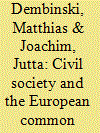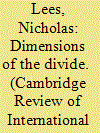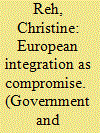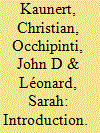|
|
|
Sort Order |
|
|
|
Items / Page
|
|
|
|
|
|
|
| Srl | Item |
| 1 |
ID:
134066


|
|
|
|
|
| Publication |
2014.
|
| Summary/Abstract |
The involvement of civil society organizations (CSOs) is widely regarded by students of the EU's domestic policy fields as enhancing transparency and accountability and, more generally, the democratic quality of political processes. This article explores the contribution of CSOs to the EU's Common Security and Defence Policy and assesses whether a democracy-enhancing effect of their involvement can also be demonstrated for this policy field. We analyse the contribution of CSOs based on two common models of democracy: the intergovernmental and the supranational model of democracy. We find that CSOs are indeed quite actively involved in the EU's security policy. With regard to their democracy-enhancing effects, however, our findings are rather mixed. While the engagement of CSOs does provide a remedy for the democratic deficits associated with intergovernmental decision-making, these organizations do not fully meet the demands posed by supranational governance.
|
|
|
|
|
|
|
|
|
|
|
|
|
|
|
|
| 2 |
ID:
115977


|
|
|
|
|
| Publication |
2012.
|
| Summary/Abstract |
Recent attempts at developing social-structural accounts of the international order have suggested that the international system might be analysed in terms of patterns of vertical differentiation and stratification. Taking up this challenge, this article argues that inequality should be understood as part of the 'deep structure' of the international system rather than in terms of the attributes of individual states. It suggests that we can understand how stratification and vertical differentiation emerge by examining five dimensions along which processes producing asymmetry occur, focusing on transactions between actors. These dimensions are: inter-state political hierarchy; secular socioeconomic development within societies; global stratification within the world economy; the dynamic of competitive development; and the process of overall collective management and supranational governance of the international system/global order. The historical intersection of these forms of stratification has produced an emergent, historically contingent division within the international order familiar to students of international politics as the North-South divide.
|
|
|
|
|
|
|
|
|
|
|
|
|
|
|
|
| 3 |
ID:
114811


|
|
|
|
|
| Publication |
2012.
|
| Summary/Abstract |
The role of compromise in EU politics has been widely recognized by scholars and practitioners alike. At the same time, the systematic conceptual, analytical and normative study of compromise has remained an exception. This is surprising, given that the study of compromise can be linked to three broader questions at the heart of integration: (1) How does the EU accommodate diversity? (2) What makes supranational rule normatively justifiable? (3) Who or what defines the limits of cooperation? Against this backdrop, this article sheds light on the concept of compromise, on the role of compromise in legitimizing supranational governance and on the limits to compromise in the European polity. I argue that the EU - a divided, multilevel and functionally restricted polity - is highly dependent on the legitimizing force of 'inclusive compromise', which is characterized by the recognition of difference. This is true for horizontal or micro-level relations between political actors (where compromise works through concessions as well as justification, perspective-taking and empathic concern in a process of 'procedural accommodation'), and for vertical or macro-level relations between systems of governance (where compromise works through 'constitutional compatibility'). Given the legitimizing force of inclusive compromise, I subsequently identify the limits to such agreements and, thus, to supranational cooperation; I argue that these limits are issue specific and depend on where the costs of cooperation are borne. The article concludes by outlining routes for follow-up empirical research.
|
|
|
|
|
|
|
|
|
|
|
|
|
|
|
|
| 4 |
ID:
129577


|
|
|
|
|
| Publication |
2014.
|
| Summary/Abstract |
Following several months of uncertainty in the wake of the rejection of the treaty establishing a constitution for Europe, the Lisbon Treaty eventually entered into force in December 2009. Although it fell short of establishing a constitution for the European Union (EU), it introduced several noteworthy changes, notably for EU internal security policies, also known as the 'Area of Freedom, Security and Justice' (AFSJ). This special section considers how various dimensions of the AFSJ have been affected by the Lisbon Treaty and the gradual reinforcement of supranational governance that it has generated in this key policy area. Over the past decade, the AFSJ has experienced tremendous development, making it one of the most dynamics areas of European integration. The AFSJ is a broad and heterogeneous policy domain, which includes asylum, immigration and border policies, counter-terrorism, justice and police cooperation, as well as the external dimension of these activities. Given the crucial importance of current internal security threats, such as terrorism, and the sensitivities surrounding policy responses to them, it is necessary to take stock of how far the EU has progressed toward its goals of an AFSJ and how this has been influenced by the most recent treaty changes. To accomplish this goal, this special section brings together some of the most distinguished scholars in the field and several younger scholars conducting cutting-edge research on the AFSJ.
|
|
|
|
|
|
|
|
|
|
|
|
|
|
|
|
|
|
|
|
|